“And then?”
“And then—there was nothing for it, I was dressed as a page and the idea of taking a boy excites George profoundly—we went to bed, of course.”
I had never in my life encountered anyone like Lady Caroline Lamb. Her frankness—her lack of embarrassment or shame—utterly silenced me; I could not summon a word. But Desdemona was otherwise; she had lived in Caro’s world from birth; as had been true of Lord Harold, there was nothing she could not hear or say without complete equanimity.
“Naturally Byron would admit to none of this at the inquest, for fear of being laughed at,” Mona said thoughtfully. “I see how it was. He has made such a publick parade of hating you—he could admit nothing so intimate without damage to his reputation. Very well—when did he leave you?”
Caro shrugged. Time , again. We were beyond saving.
“Was it light or dark, you tiresome girl?” Mona demanded.
“That lovely hour when the world entire is grey—and the birds commence their singing,” she said dreamily.
“We shall put it down as dawn.” I rose to leave. “Thank you, Lady Caroline, for your confidence. We are in your debt.”
“I should say, rather, that George is,” she returned quite calmly. “Provided he escapes the gibbet, of course. Perhaps you will nod to me now, Mona, when we pass each other in Hyde Park?”
“Perhaps, Lady Caroline.” And Desdemona curtseyed with quelling stile.
WHEN WE HAD BEEN RELEASED BY A FOOTMAN INTO THE courtyard sweep fronting the Pavilion, the Countess halted in her steps, and looked to me appealingly.
“This will utterly sink poor Jane Harley. First Catherine Twining—and now the impossible Caro Lamb. I declare, had I never known my beloved Charles—I should believe all men heartless.”
“Say rather they possess too much heart—it is fidelity that is lacking,” I returned. “But I am not convinced Lady Oxford must be told. The outcome shall depend upon our success or failure, Mona—for if we discover the true murderer, Byron need never stand trial. And if he does not come before the Assizes, Lady Caroline’s story may remain exactly that: one of the fantastic tales dreamt up in her bower.”
The Countess glanced at me narrowly. “You still believe him innocent?”
“If we are to believe Caro, then we must believe her wholly; we cannot pick and chuse which bits of evidence to credit. Therefore, if we accept that Byron was here, and left her at dawn, it is impossible for Byron to have drowned Catherine Twining—for she cannot still have been alive at such an hour as half-past five o’clock. She was killed within moments of leaving this place—else she should have achieved her home, and lived to dance at another Assembly. By dawn poor Catherine was already drowned and lashed into Byron’s hammock. She must have been carried to the Arms in the dead of night—when all the intimates of both Pavilion and publick house should be deemed to be sleeping.”
“Caro wasn’t sleeping,” Mona interjected darkly.
“The risk of being heard at dawn,” I persisted, “—or indeed, seen by a member of Tolliver’s household, as the culprit exited the tunnel in one bedchamber and thrust the body into Byron’s empty rooms next door—should be too great. It cannot have been Byron who did all this.”
“As you say.” Mona drew on her gloves. “Then who killed her, pray?”
At that moment, the great clock in the stable block’s tower to the west of us began to toll the hour; Catherine Twining’s service must be over, and it was already noon. The striking clock put me in mind of something I had nearly forgot.
“Mona,” I said, “all that we have discovered derives from what the magistrate and coroner neglected to ask. Do you not think that the key to this tragedy lies in how one puts the questions—and to whom?”
“Very well,” she sighed, “I shall rephrase mine. Pray, Jane— who killed Catherine Twining ?”
“There was one other person abroad that night who may very well know. Are you incommoded by the smell of the stables, Countess?”
She drew herself up. “You forget. I have been accustomed to ride with the Quorn.”
“Ah—but can you converse with the undergroom?” I wondered, and walked purposefully towards the Regent’s sixty horses.
THERE WERE, OF COURSE, A DOZEN UNDERGROOMS, AND even two who bore the name of Jem; but we very quickly established which of these was cousin to my chambermaid, Betsy—by enquiring of the Regent’s Head Groom, a very august gentleman in buff and blue livery. We expressed nothing more than a desire to convey a message from one servant to another, and if the Head Groom thought it odd that two ladies, one of them in mourning, should embark on such a trivial errand, he was far too well-bred to say so.
We found Jem in a beautifully-appointed loose box which held a fine-boned mare and her foal—a filly but four days old. The undergroom was concocting a warm bran mash for the mare, and murmuring foolish nothings to the foal, who lay flat on her side lost in sleep, her fragile ribs rising and falling with every breath. The box was warm with the heat of the animals and the strong smell of them, overlaid with the sweetness of the straw bedding and the hay in the feeding racks. I have never been much of a horsewoman—a family lack, which may be put down to our straitened circumstances. My elder brothers hunted with the Vyne—our local pack in Hampshire—whenever our friends the Chutes were willing to mount them; but there was no gentle riding hack for my sister, Cassandra, or me. That does not mean, however, that I am afraid of horses, or do not enjoy being near them. I lacked Mona’s easy familiarity, however—she had no hesitation in leaning over the half-open door of the box, extending her gloved hand, and clucking softly to the mare—who stepped delicately over her sleeping foal and thrust a soft nose into Mona’s gloved hand.
“She hopes that I have brought her sugar,” Mona said, “but I am a rank cheat, you beauty, and have nothing to offer. What is her name, sirrah?”
“Rapunzel, on account o’ her long tail, my lady.” The undergroom lifted his hand to his forehead in respect, and stared at us.
Mona stroked the small Arab head. “And does she like to run?”
“Aye, but she’s no hunter. A neat little mount for a lady, when she’s not to foal. Granddaughter to Eclipse, she is—no better blood in the Kingdom.”
“I believe it. Pray—go on with your bran mash. We have no wish to disturb you at your work. I am the Countess of Swithin, and this is my friend, Miss Austen—who is acquainted with your cousin Betsy.”
The undergroom coloured, and dropped his gaze. “The lady’d be a guest over to the Castle?”
“I am—and was a friend to the young lady who met her death by drowning a few nights ago. Betsy said you spoke of her, at the inquest; I am glad to hear it. You have done a good deal towards apprehending a murderer.”
“Arrested Lord Byron, they did,” he said warily, and began stirring his bran with vigour.
“But you know that to be nonsense.”
Jem glanced up at me swiftly, but said nothing.
“You saw Lord Byron enter the Pavilion that evening?”
“Aye, and he did.”
“And then Miss Twining left it? When the clock chimed the three-quarters?”
He hesitated; it was probable he wondered what right we had to put such questions to him—but the habit of submitting to authority prevailed. With a slight grimace, he nodded.
“Was Lord Byron with her when she quitted the place?”
“No, ma’am.”
“Did he pursue Miss Twining once she was gone?”
Another hesitation. “I was inside the box here with the mare, after the young lady—Miss Twining as it was—left. I stepped outside for just the short while, like, to fetch a rope—I had to slip it round the foal’s head, and help the mare to birth it—and that’s when I see her. I didn’t see much more than that.”
Читать дальше












